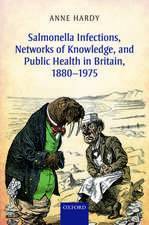The Epidemic Streets: Infectious Diseases and the Rise of Preventive Medicine 1856-1900
Autor Anne Hardyen Limba Engleză Hardback – 21 oct 1993
Preț: 1155.58 lei
Preț vechi: 1756.94 lei
-34% Nou
Puncte Express: 1733
Preț estimativ în valută:
221.19€ • 240.34$ • 185.92£
221.19€ • 240.34$ • 185.92£
Carte tipărită la comandă
Livrare economică 09-15 aprilie
Preluare comenzi: 021 569.72.76
Specificații
ISBN-13: 9780198203773
ISBN-10: 0198203772
Pagini: 338
Ilustrații: figures, tables
Dimensiuni: 162 x 242 x 25 mm
Greutate: 0.62 kg
Ediția:New.
Editura: Clarendon Press
Colecția Clarendon Press
Locul publicării:Oxford, United Kingdom
ISBN-10: 0198203772
Pagini: 338
Ilustrații: figures, tables
Dimensiuni: 162 x 242 x 25 mm
Greutate: 0.62 kg
Ediția:New.
Editura: Clarendon Press
Colecția Clarendon Press
Locul publicării:Oxford, United Kingdom
Recenzii
'The depth and range of Hardy's analysis mark this book as one of the most significant contributions to this ongoing debate.'T.P. Gariepy, Choice, Jul/Aug '94
'A specialist monograph, which will appeal to many interested in public health and infectious disease ... The book's strength lies in its meticulous use of public health data from local and national reports.'Brian Hurwitz, British Medical Journal, Volume 309, 1994
'a highly informative and stimulating book ... Its importance lies in the breadth of its perspective and the good sense with which the author evaluates the wide array of possible influences ... this book raises many new questions that will influence how the rest of us do our research in the future.John M. Eyler, Medical History, October 1994
'Hardy provides a new perspective, arguing not only that smallpox itself was undergoing a period of diminished virulence in the second half of the 19th century, but also that preventive measures other than vaccination were possibly more important ... she provides useful insight into 19th century British public attitudes to health and illness and to children ... This study is an ambitious undertaking, and Anne Hardy is to be commended for examining - and trying to make sense of - masses of local medical reports and studies. Her book will prove essential reading for those interested in 19th century public health and/or the McKeown debate, although the case against McKeown is not yet settled.'Linda Bryder, University of Auckland, Metascience, Issue 6, '94
This culminating monograph bears all the hallmarks of her previous efforts: meticulous in-depth research, clearly argued and written in a style accessible to both specialists and lay readers alike...Hardy marshalls her evidence skilfully.
The choice of London as a focus for the study is valuable ... The layout of the book will make it valuable for teaching as care is taken to give an account of the etiology and disease processes involved for each infection.
she provides useful insight into 19th century British public attitudes to health and illness and to children ... This study is an ambitious undertaking, and Anne Hardy is to be commended for examining - and trying to make sense of - masses of local medical reports and studies. Her book will prove essential reading for those interested in 19th century public health and/or the McKeown debate, although the case against McKeown is not yet settled.
'A specialist monograph, which will appeal to many interested in public health and infectious disease ... The book's strength lies in its meticulous use of public health data from local and national reports.'Brian Hurwitz, British Medical Journal, Volume 309, 1994
'a highly informative and stimulating book ... Its importance lies in the breadth of its perspective and the good sense with which the author evaluates the wide array of possible influences ... this book raises many new questions that will influence how the rest of us do our research in the future.John M. Eyler, Medical History, October 1994
'Hardy provides a new perspective, arguing not only that smallpox itself was undergoing a period of diminished virulence in the second half of the 19th century, but also that preventive measures other than vaccination were possibly more important ... she provides useful insight into 19th century British public attitudes to health and illness and to children ... This study is an ambitious undertaking, and Anne Hardy is to be commended for examining - and trying to make sense of - masses of local medical reports and studies. Her book will prove essential reading for those interested in 19th century public health and/or the McKeown debate, although the case against McKeown is not yet settled.'Linda Bryder, University of Auckland, Metascience, Issue 6, '94
This culminating monograph bears all the hallmarks of her previous efforts: meticulous in-depth research, clearly argued and written in a style accessible to both specialists and lay readers alike...Hardy marshalls her evidence skilfully.
The choice of London as a focus for the study is valuable ... The layout of the book will make it valuable for teaching as care is taken to give an account of the etiology and disease processes involved for each infection.
she provides useful insight into 19th century British public attitudes to health and illness and to children ... This study is an ambitious undertaking, and Anne Hardy is to be commended for examining - and trying to make sense of - masses of local medical reports and studies. Her book will prove essential reading for those interested in 19th century public health and/or the McKeown debate, although the case against McKeown is not yet settled.












